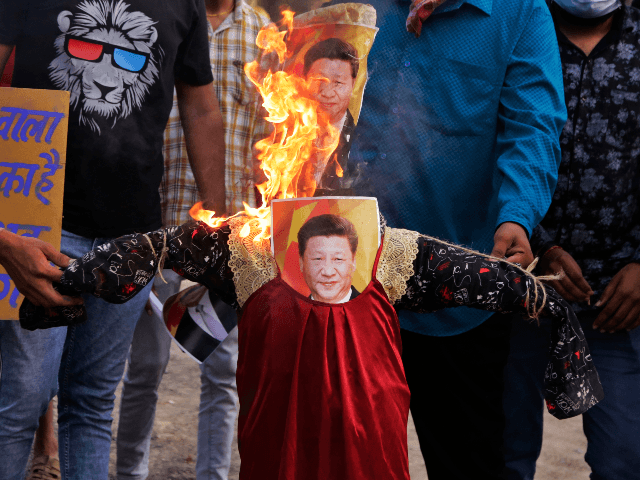Former Tsinghua University professor Xu Zhangrun, who Chinese officials arrested and fired after publishing multiple letters condemning Tsinghua alum Xi Jinping’s authoritarian regime, penned a letter this weekend vowing to continue challenging the Communist Party and thanking supporters.
Police arrested Xu in early July after he published a letter condemning the Chinese dictator’s coronavirus response and warning that Xi’s mismanagement of China – from allowing millions to languish in poverty while Communist Party leaders live lavishly to failing to provide basic government services in nearly every corner of the country – would lead to the world divorcing China diplomatically, leaving it to fail on its own.
Police claimed that Xu had solicited prostitutes, a crime in China. Xu denied the charges and many of his supporters have vocally condemned Beijing for attempting to smear Xu personally in an attempt to discredit his political commentary.
On Sunday, Xu wrote his first public statement since his arrest and release, which also resulted in his dismissal from Tsinghua University after two decades of teaching there. Xu revealed that friends and supporters, including Tsinghua staffers, around the world had donated to a fund to ensure that he could survive while unemployed, leaving him nearly $15,000, and urged them to donate to more needy people, as he currently had the means to generate income elsewhere.
Xu also vowed continued outspoken resistance to the Chinese communist regime despite the repressive tactics against him. Xu published the letter on Sunday.
“Today, as in the past, the power-holders continue to indulge their every extravagance even as the majority of our compatriots get by on the most meagre of incomes by sheer dint of hard work and constant struggle,” Xu wrote. “Now, the official media is blustering about the prosperous age even as half of our nation is submerged in floodwaters, and while the ship of state itself lurches on its unsteady course.”
China is currently experiencing some of the worst floods in its modern history, causing its largest river, the Yangtze, to flood major metropolitan areas in the center of the country. Wuhan, the city where the Chinese coronavirus pandemic originated, is among the most severely affected by evacuations and infrastructure destruction. The floods are reportedly threatening to destroy the Three Gorges Dam, communist China’s flagship infrastructure achievement, leading Chinese officials to blow up a smaller dam elsewhere on the Yangtze to decrease the pressure on Three Gorges.
Xu noted the floods in his letter, as well as Xi Jinping’s lack of response to them. Other than leading bureaucratic meetings in Beijing – which at press time have not resulted in any significant government action at the federal level – Xi has been absent from the Yangtze flood crisis. Xu asserted that China’s communist system will soon collapse.
“The political system remains recalcitrant, refusing to change; now the whole world is on guard. Imperial hauteur has turned China into a boastful orphan,” Xu wrote. “There is no doubt in my mind that totalitarianism such as this will come to no good end and that true freedom will finally visit our land. The Will of Heaven and the Hearts of Humanity, like the luminosity of the Sun and Moon, show the way!”
“As long as I draw breath, I will continue to speak out. This is incumbent upon me and it is my fate,” Xu promised.
The scholar also condemned his peers who remained silent in the face of Communist Party human rights abuses.
“This is a time in which those who are learned enough to know better for the most part reveal their stunted souls; their vacuous mummery is egregiously self-indulgent,” Xu asserted. “As for officialdom, it is a home to ashen hearts and indolent minds. From top to bottom the bureaucracy brims over with abhorrent lassitude and delinquency.”
By the time of his arrest in early July, Xu had spent years criticizing Xi’s regime, particularly for deviating from alleged reforms under Mao Zedong’s predecessor, Deng Xiaoping. In 2018 – a particularly turbulent year for Xi as protests spreading nationwide in response to his government’s failure to properly vaccinate hundreds of thousands of children – Xu called Xi’s policies a “betrayal both of our traditions and of our present aspirations.” Xu also condemned Xi Jinping’s most ambitious policy proposal, the Belt and Road Initiative (BRI), a global plan to offer predatory loans to developing countries as a way to colonize them.
“Why is China, a country with over one hundred million people who are still living below the poverty line, playing at being the flashy big-spender?” Xu asked at the time. “How can the Chinese not comment in astonishment: just what is the Supreme Bureaucratic Authority thinking?”
In February, Xu condemned Xi’s handling of the Chinese coronavirus pandemic.
“The political system has collapsed under the tyranny, and a governance system [made up] of bureaucrats, which has taken [the party] more than 30 years to build has floundered,” Xu asserted. “The mess in Hubei is only the tip of the iceberg and it’s the same with every province.”

COMMENTS
Please let us know if you're having issues with commenting.